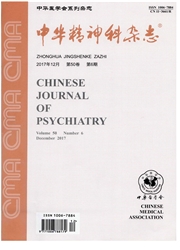

 中文摘要:
中文摘要:
目的观察急性腹腔注射N-甲基-D-天冬氨酸(NMDA)受体拮抗剂地卓西平马来酸盐(MK-801)对大鼠自发活动、感觉运动门控和物体再认记忆的影响,探讨MK-801模拟精神分裂症不同内表现型的适宜剂量。方法成年雄性SD大鼠共104只,按照体质量采用分层随机化方法进行分组。(1)取SD大鼠48只,分为MK-801小剂量组、MK-801中剂量组、MK-801高剂量组和对照组,每组12只,观察不同剂量MK-801(0.1、0.2、0.4mg/kg)对大鼠自发活动的影响;(2)取SD大鼠32只,分为MK-801小剂量组、MK-801中剂量组、MK-801高剂量组和对照组,每组8只,观察不同剂量MK-801(0.1、0.2、0.4mg/kg)对大鼠前脉冲抑制(PPI)的影响;(3)取SD大鼠24只,分为MK-801小剂量组和对照组,每组12只,观察小剂量MK-801(0.1mg/kg)对大鼠物体辨别测试的影响。结果(1)中高剂量MK-801(0.2,0.4mg/kg)呈剂量依赖性诱导大鼠自发活动的增加以及PPI的损害(P〈0.05或P〈0.01),小剂量(0.1mg/kg)组在自发活动和PPI上与对照组差异无统计学意义(P〉0.05)。(2)小剂量MK-801组在物体辨别测试中对新物体的偏爱指数显著低于对照组[(57.79±10.66)%比(73.34±18.52)%,P〈0.05]。结论中高剂量MK-801可引起自发活动和感觉运动门控功能异常,而小剂量在排除运动系统异常的前提下可特异性地破坏大鼠的再认记忆,提示MK-801模拟精神分裂症的不同内表现型时应根据研究目的选择适宜剂量。
 英文摘要:
英文摘要:
Objective To investigate the effects of acute administration of dizocipline maleate ( MK- 801 ), the N-methyl-D-aspartate (NMDA) receptor antagonist, on locomotor activity, sensorimotor gating and object recognition memory in rats and to determine the appropriate doses for modelling each above- mentioned endophenotypes of schizophrenia. Methods Adult male Sprague-Dawley (SD) rats ( n = 104) received an intraperitoneal injection of either different dosage of MK-801 or saline 20 min prior to daily behavioral testing. ( 1 ) To investigate the effects of acute treatment of MK-801 (0. 1,0. 2, 0. 4 mg/kg) on locomotor activity. (2) To investigate the effects of acute treatment of MK-801 (0. 1,0. 2, 0. 4 mg/kg) on prepulse inhibition (PPI) . (3) To investigate the effects of acute treatment of low-dose MK-801 (0. 1 mg/kg) on the object recognition test. Results ( 1 ) MK-801 0. 2 mg/kg and 0.4 mg/kg increased locomotor activity and decreased PPI in a dose-dependent manner(P 〈 0. 05 or 0. 01 ). The 0. 1 mg/kg group didn't show any significant difference in either locomotor activity or PPI compared to the control group. (2) The MK-801 (0. 1 mg/kg) group exhibited a significantly lower preference index than the control group in the object recognition test [ ( 57. 79 ± 10. 66 ) % vs. ( 73.34 ± 18.52 ) %, P 〈 0.05 ] . Conclusion Medium- and high-dose MK-801 could induce deficits in locomotor activity and sensorimotor gating, whereas low-dose MK-801 could significantly impair the object recognition memory without inducing obvious motor dysfunction, indicating that different doses of MK-801 are recommended when mimicking different endophenotypes of schizophrenia.
 同期刊论文项目
同期刊论文项目
 同项目期刊论文
同项目期刊论文
 Persisting cognitive deficits induced by low-dose, subchronic treatment with MK-801 in adolescent ra
Persisting cognitive deficits induced by low-dose, subchronic treatment with MK-801 in adolescent ra Expressions of Neuregulin 1 beta and ErbB4 in Prefrontal Cortex and Hippocampus of a Rat Schizophren
Expressions of Neuregulin 1 beta and ErbB4 in Prefrontal Cortex and Hippocampus of a Rat Schizophren Postnatal BDNF Expression Profiles in Prefrontal Cortex and Hippocampus of a Rat Schizophrenia Model
Postnatal BDNF Expression Profiles in Prefrontal Cortex and Hippocampus of a Rat Schizophrenia Model 期刊信息
期刊信息
